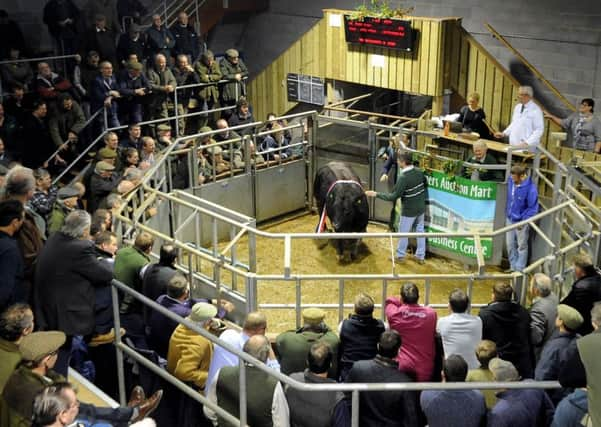Anne McIntosh: Farmers need answers before crucial EU decision


Britain, Ireland and Denmark joined the European Economic Community in 1973 and this became the Single European Market in 1992.
The first products where the Member States pooled their resources were coal and steel, chosen as long ago as 1952 because they were deemed to have permitted Germany to become aggressive towards her neighbours and trigger two world wars in the space of 25 years.
Advertisement
Hide AdAdvertisement
Hide AdAgainst the backdrop of food rationing following the end of the Second World War, the Common Agricultural Policy was created to supply a safe and secure food supply at steady prices. Europe went from rationing to food mountains and wine lakes. Now the cost of food production and farm gate prices are falling.
The European Union has become a hugely successful trading bloc, attracting former Communist countries wanting to turn their backs on the strictures of the Soviet Union and fix their colours to the safety and security of the EU and Nato mast.
So 40 years on, what would the benefits be and implications for our farmers of remaining in the EU?
We must recognise from the outset that we joined what was more than a market, but a customs union sharing preferential entry to the markets for all products from the countries in the then EEC.
Advertisement
Hide AdAdvertisement
Hide AdWhat would the situation be if we left? Would there be no deal for our products to enter the European market?
What would the relationship be with other countries, such as the USA who often display a tendency towards protectionism, and those Commonwealth nations whose members now have access to the EU?
And then there are the emerging markets of China, Japan and Brazil, with whom we would have to revert to negotiating on our own, and not as part of the EU international trading bloc. What happens then?
These are the fundamental questions to be addressed and finding answers to them is becoming increasingly urgent.
Advertisement
Hide AdAdvertisement
Hide AdAs part of the EU, Yorkshire farmers can access a market of 28 countries with 508 million consumers. UK consumers have unbridled access to EU imports too.
We are currently only 62 per cent self–sufficient. We need to increase this and the NFU, and others, are working hard to achieve this.
There is a natural market for our spring lambs in France. There is a huge potential market in China for our pigs’ trotters and other pig parts which we do not find appetising but the Chinese do.
Adding value to our major liquid milk market by producing cheese, yoghurt and other such dairy products reaps great rewards, such as those achieved by Shepherds Purse cheeses based near Thirsk.
Advertisement
Hide AdAdvertisement
Hide AdWhat happens to the ability to export to these existing markets and develop potential new ones if Britain left the EU?
Yorkshire farmers currently benefit from the CAP through Basic Farm Payments and the new environmental programmes. What support would Yorkshire farmers enjoy if Britain left the EU? Would the elusive level playing field be lost forever if Britain left the pitch and faced the situation where our producers, with no support, competed against those who continued to benefit from CAP payments?
Inside the EU, our farmers would continue to benefit from free, unhindered access and export as now. If Britain left the EU, would we be considered to have the same status as Norway, with preferential access as a member of the European Economic Area (the EEA)?
Or would we be subjected to the rules of the World Trade Organisation (WTO) and have to renegotiate every item and every product, and then agree its nomenclature and description, before access to the market was allowed?
Advertisement
Hide AdAdvertisement
Hide AdThe fact is that no one knows and no one seems to want to talk about it.
What is clear is that countries like Norway, Iceland and Switzerland who remain outside the EU can only trade with it by accepting all the rules agreed by the 28 member countries without having any say over them. So far from reducing the regulatory burden, Brexit would increase it without Britain and its farmers being able to influence the terms of debate.
In conclusion, the Prime Minister is allowing the very question of our membership to be determined by a once in a generation referendum. This decision is not without risk. What is needed now is an open and honest debate about this momentous decision, and its huge implications for us all – as voters, consumers and producers.
Baroness McIntosh of Pickering is a Tory peer and former chairman of Parliament’s environment select committee. She was previously the MP for Thirsk and Malton.